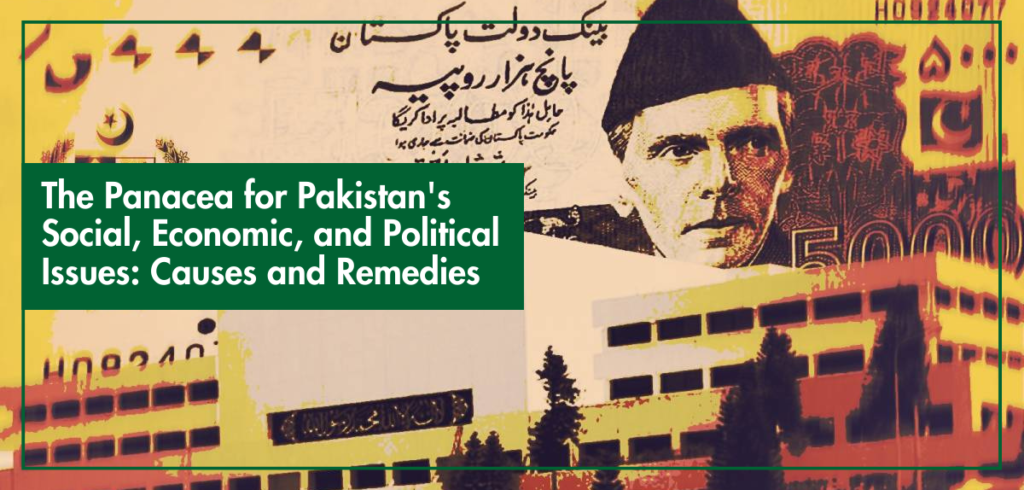Pakistan, a nation with immense potential, has faced a complex web of social, economic, and political challenges over the years. These multifaceted issues have hindered its progress and development, leaving many to ponder if there exists a panacea—a universal remedy—for these deeply entrenched problems. In this blog, we delve into the causes behind Pakistan’s myriad issues and propose remedies that, if diligently applied, can serve as a path toward a brighter future.
Causes of Pakistan’s Social, Economic, and Political Issues
Political Instability: Frequent changes in government and political instability have been recurring themes in Pakistan’s history. These shifts often result from political confrontations, a lack of consensus on vital issues, and a failure to implement long-term policies. The resulting policy discontinuity has stymied progress.
Corruption: Rampant corruption permeates various sectors of Pakistani society. It undermines trust in institutions and diverts resources away from essential services and development projects. Corruption hampers economic growth, worsens inequality, and fosters a culture of impunity.
Education Disparities: Access to education in Pakistan remains uneven, with disparities in both quality and availability. This educational divide has led to a significant knowledge gap within the population, limiting opportunities and stifling the nation’s human capital potential.
Economic Inequality: Economic inequality remains a glaring issue in Pakistan. The unequal distribution of wealth and opportunities has perpetuated poverty and limited upward mobility for many Pakistanis. Factors like nepotism and a lack of economic diversification exacerbate this inequality.
Security Challenges: Ongoing security challenges, including terrorism and sectarian violence, have had profound social, economic, and political ramifications. These issues deter foreign investment, disrupt daily life, and divert resources away from development initiatives.
Remedies for Pakistan’s Social, Economic, and Political Issues
Political Stability and Consensus Building: Pakistan needs a more stable political environment. Encouraging political parties to collaborate on key issues and fostering a culture of consensus can help reduce political instability. This requires a commitment to dialogue, compromise, and long-term planning.
Anti-Corruption Measures: Implementing rigorous anti-corruption measures is crucial. Strengthening judicial processes and holding corrupt individuals accountable can help root out corruption and rebuild public trust. Transparency in government operations is essential in this endeavor.
Investment in Education: Prioritizing education is paramount. Increasing investment in the education sector, improving access to quality education, and enhancing teacher training can bridge knowledge gaps and unlock the potential of Pakistan’s youth.
Economic Reforms: Economic reforms are essential to promote economic diversification, reduce inequality, and create job opportunities. Encouraging entrepreneurship, supporting small and medium-sized enterprises (SMEs), and simplifying business regulations can be pivotal in this regard.
Security and Counterterrorism Measures: Enhancing security measures and investing in counterterrorism efforts can create a safer environment for citizens and investors alike. A secure environment is a prerequisite for economic growth and development.
Community Engagement and Empowerment: Engaging communities in decision-making processes and empowering local governance can foster a sense of ownership and inclusivity. Addressing social issues at the grassroots level through community-driven initiatives can have a profound impact on societal well-being.
International Cooperation: Pakistan should actively seek international partnerships and collaboration to address common challenges. These may include climate change, public health crises, regional conflicts, and trade agreements. Engaging constructively with the global community can open doors to new opportunities.
Conclusion
While there may not be a single, miraculous panacea for all of Pakistan’s social, economic, and political issues, a comprehensive and sustained approach to reform can yield significant improvements. The road ahead is undeniably challenging, but Pakistan has demonstrated resilience in the face of adversity. By addressing the root causes of its challenges and embracing meaningful reforms, Pakistan can aspire to a more stable, prosperous, and equitable future. It’s a journey that requires unity, determination, and a shared vision for a better tomorrow—a tomorrow where the people of Pakistan can fully realize their nation’s extraordinary potential.

